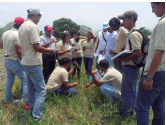Dissemination of science and technology with a focus on agricultural production: an experience in Yaracuy state
Abstract
The human being requires education to achieve the development of himself and in this way to be a more responsible and committed individual with society, the field of agricultural production in the country does not escape from it, since, in order to produce food Early training of people is required, either by ancestral tradition or technological innovation, in order to be able to successfully carry out the production process and be multipliers of knowledge in the environment where they work, being able to collaborate and carry out collective action ( Camaripano, 2013). That is, each individual places her contribution according to the preparation that he has; hence the achievement of a society more committed to the agricultural sector and therefore to food sovereignty, therefore this training should be given to students from the beginning of their education and reinforcing it at subsequent levels.
According to González et al. (2002), there is a prevailing need to modernize, modify and transform university curricula, since the current ones are far away and deviated from the essence of the act of “integrally training with social relevance”. This requires facing the challenges that economic, political, social, technological and educational development is demanding. In this sense, the processes of training, dissemination and teaching of agricultural sciences must be in accordance with the appropriate academic level and accompanied by methodologies that facilitate understanding and sensitize the individual, in addition to being applicable, the social subject trained can act as agent multiplier of these technologies, thus meeting the expectations demanded by society.
According to the above, the objective of this work was to systematize the experience obtained in the state of Yaracuy, regarding the dissemination of science and technology, as a fundamental tool to complement the training of students at different educational levels in the field of agricultural production.
References
González, R., A. Rodríguez–Mezerhane, J. Rodríguez y C. Zambrano. Currículum integral: un desafío de la educación superior agropecuaria. XI Congreso Venezolano de Producción e Industria Animal (Memorias), Valera, del 22 al 26 de octubre 2002. ULA-Trujillo.


